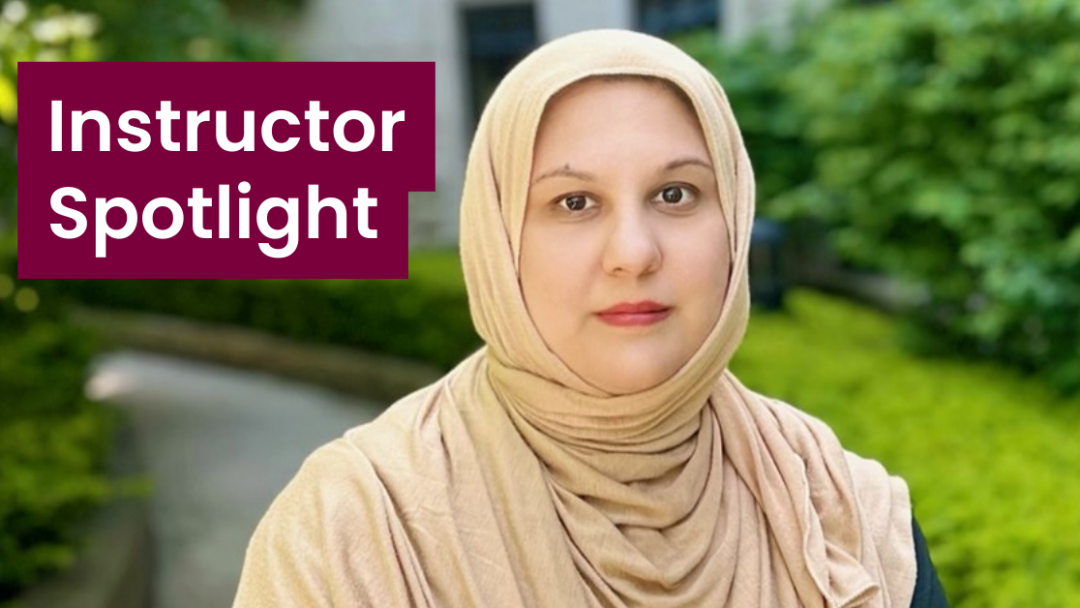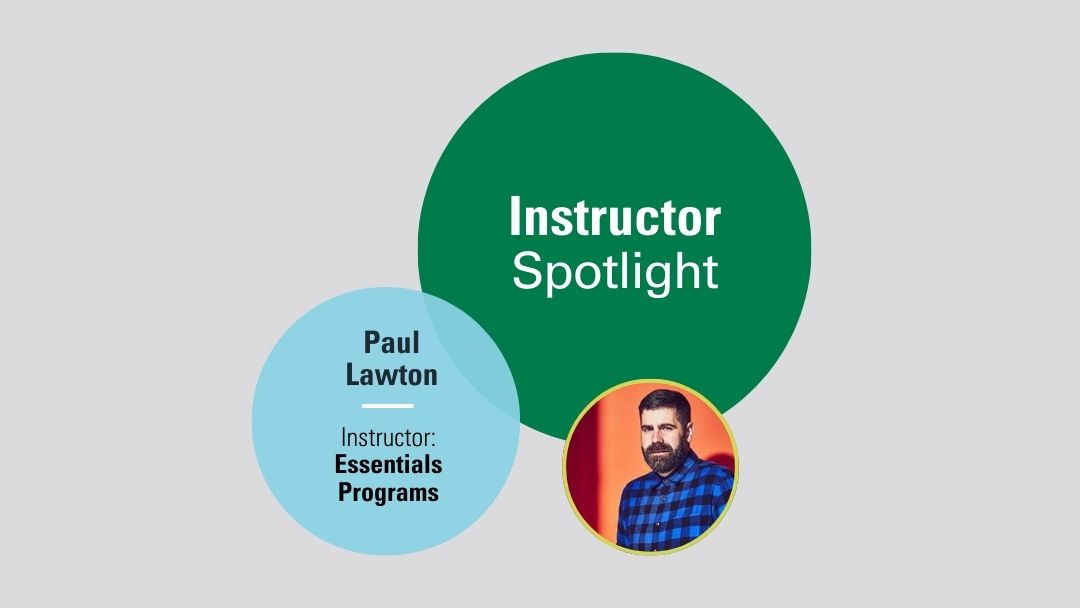Meet Munaza Jamil: A passionate educator and career motivator for clinical research professionals

Applied clinical research is experiencing tremendous growth in Canada. This field of healthcare focuses on using scientific methods and evidence to improve the diagnosis, treatment, and care of patients. Following best practices, researchers design, conduct and analyze clinical trials to test the safety, effectiveness and costs of new or existing interventions.
If Applied Clinical Research is in your future, be sure to check out programs and courses taught by experienced Clinical Research Professionals who can teach you the core competencies a career in this field requires.
Meet Munaza Jamil, one of McMaster Continuing Education’s instructors, who can help you discover the many career and business opportunities available to students in the Applied Clinical Research program.
Munaza is a certified Clinical Research Professional with over 24 years of expertise, mostly in the academic healthcare sector. Her extensive experience spans various therapeutic domains, including Oncology, Cardiovascular Surgery, and Endocrinology, across both adult and pediatric settings, encompassing all phases of clinical trials. Munaza feels deeply passionate about training and education, finding immense joy in fostering the professional growth of clinical research professionals.
What led you to become an instructor with McMaster Continuing Education?
Becoming an instructor was a natural progression for me, stemming from my deep-rooted passion for sharing knowledge and fostering professional development. With extensive experience in clinical research and a commitment to advancing the field, I recognized the opportunity to contribute to the education of aspiring clinical research professionals. Joining the Applied Clinical Research program allowed me to leverage my expertise to develop and deliver impactful course content, empowering students to thrive in the dynamic field of clinical research.
How would you describe your style of teaching?
I strive to create a culture of learning within the virtual classroom, where students are encouraged to take risks in the discussion, feel confident starting conversations, and therefore drive their instruction. Instead of using a traditional lecture-style format, my philosophy is to engage students in a two-way dialogue. I believe students learn through interactive discussion and conversation with the educator, and that is what I aim to achieve in my virtual classroom.
What will students learn from you in the Applied Clinical Research program?
Students will learn Good Clinical Practice principles and the legal, regulatory and ethical issues surrounding clinical research. They will understand how to manage study sites, and how to demonstrate leadership and strong communication when working with multiple stakeholders within the clinical trials team.
Who do you think can benefit most from this program?
The Applied Clinical Research Program can greatly benefit individuals who are seeking to advance their careers in the pharmaceutical, biotechnology, or medical device industries. Professionals such as clinical research associates, project managers, and regulatory affairs specialists can acquire essential skills and knowledge to excel in their roles. Additionally, healthcare professionals looking to transition into clinical research can find the program invaluable for expanding their expertise and advancing their careers in the field.
What are some of the newer trends in clinical research that excite you?
Several emerging trends in clinical research are particularly exciting. One such trend is the increasing integration of artificial intelligence (AI) and machine learning algorithms in data analysis, offering more efficient and accurate insights from clinical trial data. Additionally, the rise of decentralized clinical trials (DCTs) holds promise for enhancing patient recruitment, retention, and overall trial efficiency by leveraging digital health technologies and remote monitoring. Lastly, the growing focus on patient-centric approaches, including patient-reported outcomes and real-world evidence, signifies a paradigm shift towards more personalized and holistic healthcare solutions, which I find particularly inspiring.
What do you see as the future of clinical trials?
The future of clinical trials is poised for significant transformation driven by technological advancements and evolving patient-centric approaches. Decentralized and virtual trials will continue to gain traction, offering greater accessibility and convenience for participants while streamlining data collection processes.
Efforts to enhance inclusivity and representation in clinical trials are gaining momentum, driven by a recognition of the importance of ensuring that clinical trial results are applicable and beneficial to all demographics. Initiatives such as community engagement, culturally sensitive recruitment strategies, and partnerships with underrepresented groups are pivotal in fostering trust and participation. By prioritizing diversity and equity, clinical trials can yield more robust and generalizable findings, ultimately advancing healthcare outcomes for all individuals, regardless of background or circumstance.
What are the key skills needed for a successful career in applied clinical research?
A successful career in applied clinical research requires a combination of technical expertise, analytical skills, and interpersonal abilities. Professionals in this field must possess a solid understanding of clinical trial methodologies, regulatory requirements, and Good Clinical Practice (GCP) guidelines. Strong critical thinking and problem-solving skills are essential for interpreting complex data and resolving challenges that may arise during the research process. Additionally, effective communication and collaboration skills are crucial for working with multidisciplinary teams, investigators, and regulatory agencies to ensure the successful planning and execution of clinical trials.
What advice would you offer to students or someone considering a career in applied clinical research?
If you’re currently a student, don’t underestimate the potential benefits of volunteering within the field. Look for volunteer opportunities in clinical research settings like hospitals, clinics, or internships with industry partners. These experiences will not only enhance your real-world skills but also allow you to apply what you’ve learned in the classroom and expand your professional network.
For those contemplating a career in clinical research, it’s crucial to thoroughly research the various facets of the profession. Clinical research encompasses diverse roles, responsibilities, and salary ranges. Job titles and compensation can vary significantly, with industry positions generally offering higher pay but differing greatly in culture and workload compared to academic healthcare settings. Consider reaching out to other clinical research professionals to gain insights from their experiences and identify the best fit for your career goals.
What do you think your students would be most surprised to learn about you?
Some fun facts about myself: I’ve lived in four countries and speak six languages!
I have lived experience as a refugee and asylum seeker in Canada, having fled persecution faced by my faith-based community in my birth country. I came to Canada alone, as a teenager, navigating the challenges of resettlement and adaptation while advocating for myself in a new environment. My personal journey equips me with a unique perspective to champion inclusion and equity for immigrants in healthcare research. Drawing from my insights and empathy, I am committed to driving meaningful change in the field, ensuring that the voices and experiences of immigrant communities are heard and valued.
Munaza chairs the N2 Public Engagement Committee, where she champions many EDI initiatives. She is on the executive board of ACRP Canada. She is an active collaborator and mentor with IMPaCT trials, a CIHR-funded Clinical Trials Training Platform. She also sits on the Joint Task Force for Clinical Trials Competency at the MRCT Center at Harvard, which has defined the core competency framework for clinical research professionals globally.
Learn more
Applied Clinical Research Program
Earn your Certificate in Applied Clinical Research
Health, Instructor SpotlightRelated News
News Listing

Navigating the Job Market: Top In-Demand Roles Across Industries in 2024
Business, Career, Digital Marketing, Health, Latest News, Marketing, Tech & Data, What's New
July 16, 2024

Meet Paul Lawton: Developing your brand with style and confidence
Business, Instructor Spotlight, Professional Development
April 16, 2024

Mastering the Art of Self-Regulation: 5 Tips to Soothe Your Nervous System
Health, Tips Corner, What's New
April 11, 2024
